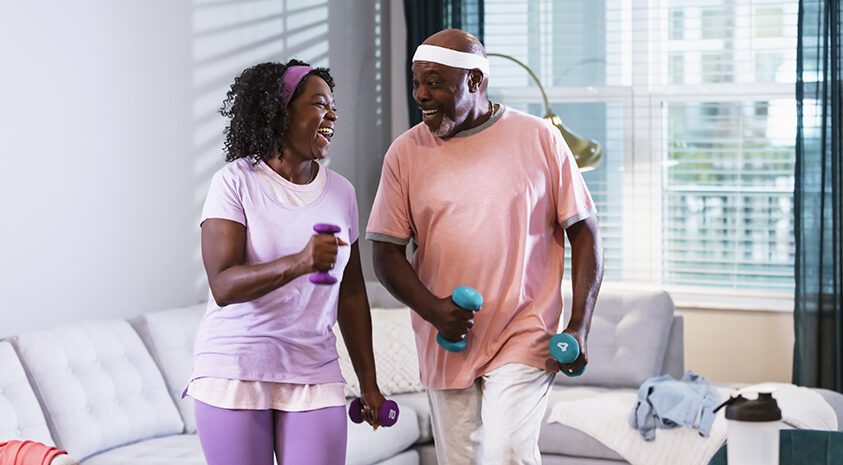Maintaining your physical and mental health becomes more important than ever as you age. But when you lack the structure and schedule you had pre-retirement, you may feel at a loss for where to start with your wellbeing.
Read this article to learn what wellbeing might look like in retirement and concrete steps you can take to start improving your overall health.
Why Is Wellbeing Important?
As you age, your health becomes more important than ever. In one study, experts collected data on the following lifestyle factors:
- Maintaining a healthy eating pattern
- Not smoking
- Getting at least 3.5 hours of moderate to vigorous physical activity each week
- Drinking only moderate amounts of alcohol
- Maintaining a normal weight
Researchers discovered that people who maintained these healthy lifestyle factors lived for over a decade longer than people who did not.
It’s important to take action and stay physically and mentally healthy throughout your golden years. But if your finances are tight or your pace is slowing down, this can be easier said than done. Here are a few guidelines to follow with accessible advice on how you can maintain your wellbeing in retirement.
Stay Physically Active
Staying physically active as much as you are able prevents bone loss and injury while improving your immunity. Make sure to speak with your doctor before beginning any new exercise program.
Some of the best ways for senior adults to stay physically active include:
- Hiking
- Walking or running
- Dance class
- Swimming or water aerobics
- Yoga
- Riding a bike
- Yard work
- Tennis
- Bodyweight exercises
- Working with resistance bands
- Bowling
You don’t have to participate in an organized workout program or take a fitness class to move your body. Chasing your grandkids around or working in the garden counts, too! Experts recommend at least 150 minutes a week of anything that gets your heart beating faster, and at least two days a week of activities to strengthen your muscles.
Eat Well
First and foremost, follow any nutrition recommendations or diet plans you have been given by your doctor or other healthcare provider.
Beyond that, here are a few meal plans to try:
- DASH — The DASH (Dietary Approaches to Stop Hypertension) diet focuses on foods that contain lots of potassium, calcium, and magnesium to lower blood pressure.
- Mediterranean — The Mediterranean diet contains fruits, vegetables, whole grains, legumes, nuts, seeds, and heart-healthy fats to prevent heart attacks and strokes.
- Mayo Clinic — The Mayo Clinic diet encourages you to eat lots of foods from the bottom of the food pyramid, such as fruits and vegetables.
Eating well doesn’t have to be boring. Set up an at-home salad bar, invite friends over for a healthy brunch, or pick out a type of vegetable you’ve never cooked before.
And remember, food is more than just fuel — it’s also a source of joy and memories. So don’t feel guilty about trying that new cookie recipe with your grandkids.
Maintain Your Emotional Health
Wellness is more than just your diet and exercise habits. Your emotional health is important, too.
A major way to boost your emotional health is to stay connected with your community. Do you attend church or other religious services weekly? Could you set up video calls with your grandchildren more often? Does your local park and rec center offer classes on something you’re interested in?
If you’re having trouble finding opportunities to socialize, consider volunteering for a cause you care about. Volunteering doesn’t have to be high-energy if you’re moving slower than you used to. Consider brushing cats at your local Humane Society; calling home-bound seniors to make sure they’re safe and well; or making care packages for military members.
And remember, sometimes it takes going out of your comfort zone to make a new friend. Don’t be afraid to knock on a neighbor’s door and invite them over to dinner or out to see a movie — even if it’s someone you have rarely spoken to before. They might be craving connection, too.
Get Enough Sleep
Older adults need at least seven hours of sleep per night. If you don’t sleep enough, you may be more vulnerable to health issues such as high blood pressure, heart disease, and stroke. You can also be irritable, forgetful, and more prone to falling after a poor night of sleep.
If you’re having trouble developing a good sleep routine in retirement, try these tips:
- Exercise in the morning.
- Avoid caffeine and alcohol later in the day.
- Unplug from screens an hour before going to bed.
- Set a time for lights-out and stick to it every night.
- Get up at the same time every morning.
If you’ve been having trouble sleeping for more than four weeks and it’s interfering with your daytime activities, speak with your doctor to rule out underlying issues such as sleep apnea.
Manage Your Stress
It might seem like retirement is all about relaxing and enjoying life. And while ideally, that would be true, you may find yourself more stressed out than you expected.
Retirees may feel anxious, depressed, or stressed due to situations such as grieving the loss of a loved one; transitioning from a career to retirement; or feeling isolated and lonely, especially during the COVID-19 pandemic. One in four adults ages 65 or older reported anxiety or depression in August 2020.
If you are experiencing symptoms such as a persistent feeling of sadness, feeling hopeless, or no longer enjoying pleasurable activities, speak to your doctor if the symptoms persist for over two weeks. Speaking with a therapist or counselor could provide a much-needed outlet to identify emotions and calm your mind.
Other ways to manage stress include getting enough sleep, unplugging from social media or the internet, and trying meditation.
Engage Your Brain
Cognitive function is another integral part of wellbeing as you age. Intentionally keeping your mind active helps maintain your memory and problem-solving skills.
Engage your brain through activities such as:
- Chess
- Bridge
- Crosswords
- Sudoku
- Meditation
- Jigsaw puzzles
- Video games
- Learning a new language or a new skill
- Listening to music or learning a musical instrument
A healthy diet, plenty of sleep, and regular exercise benefit your brain, too.
We’re here to help
Contact a Bankers Life agent today and start planning a happy—and healthy—retirement.



